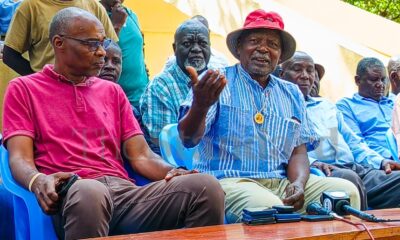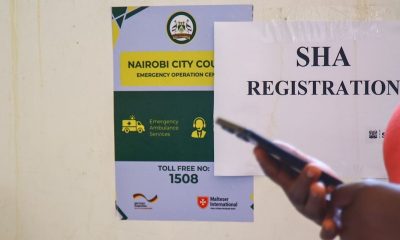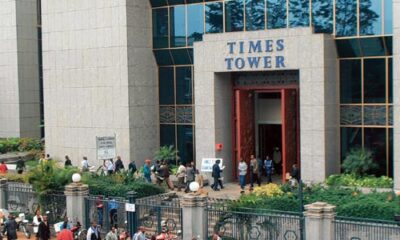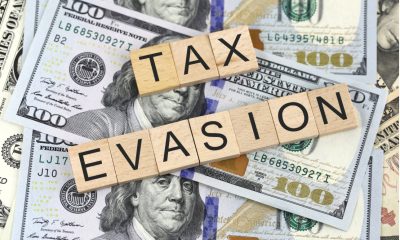News
Traders Who Don’t Pay Housing Levy Face Account Freezes as KRA Embarks on Non-Compliance Crackdown in the Informal Sector
Under Section 42 of the Tax Procedures Act, KRA has the authority to deactivate tax PINs, impose travel bans, and seize funds from defaulters’ bank accounts. These measures will now be applied to enforce compliance with the housing levy.

Traders in Kenya’s informal sector who fail to comply with the mandatory 1.5 percent housing levy could soon face punitive measures, including frozen bank accounts and blocked tax PINs, as the government intensifies efforts to enforce the controversial deduction.
The Kenya Revenue Authority (KRA), in collaboration with the Affordable Housing Board, is set to launch a crackdown on defaulters, particularly in the largely unregulated informal sector. Many businesses, including bars, salons, and small retail shops, have been accused of failing to remit the levy from their employees’ wages.
The housing levy, which requires workers—both formal and informal—to contribute 1.5 percent of their gross salaries, was introduced in July last year to finance the construction of affordable housing units for low-income earners. While salaried employees have had deductions made directly by their employers, compliance within the informal sector has remained low due to the self-declaration nature of the levy.
Affordable Housing Board’s acting chief executive, Sheila Waweru, acknowledged that contributions from informal workers have been slow but insisted that enforcement will be necessary to ensure compliance.
“There are people in the informal sector who are already contributing, but we don’t have everybody on board because it is based on self-declaration,” said Waweru. “If you are not truthful about your business, income, and employees, enforcement measures will apply.”
The KRA plans to deploy revenue service assistants to conduct background checks and on-site inspections of businesses. According to the agency, informal traders are expected to calculate their contributions based on total revenue minus the cost of goods sold, while employers in the sector must deduct and match employees’ contributions before remitting them to KRA.
Under Section 42 of the Tax Procedures Act, KRA has the authority to deactivate tax PINs, impose travel bans, and seize funds from defaulters’ bank accounts. These measures will now be applied to enforce compliance with the housing levy.
The Affordable Housing Act 2024, signed into law by President William Ruto in March, mandates that all workers contribute to the fund, a move that followed a court ruling declaring the initial levy unconstitutional for discriminating against informal workers. However, the levy has sparked widespread opposition, with critics arguing it adds to an already heavy tax burden.
The Ruto administration aims to build 250,000 affordable housing units annually using proceeds from the levy. Currently, 4,888 units are up for sale across the country. One key requirement for accessing these units is a tax compliance certificate, effectively tying homeownership opportunities to tax and levy contributions.
Despite missing its initial revenue target of Sh54.58 billion by a narrow margin, collecting Sh54.16 billion in the first year, the government remains determined to boost compliance. With informal sector contributions still unclear, authorities hope that stringent enforcement measures will encourage more traders to comply.
For informal workers, the crackdown signals an urgent need to regularize their contributions—or risk facing severe financial and legal consequences.
Kenya Insights allows guest blogging, if you want to be published on Kenya’s most authoritative and accurate blog, have an expose, news TIPS, story angles, human interest stories, drop us an email on [email protected] or via Telegram
-

 Business3 days ago
Business3 days agoCooking Fuel Firm Koko Collapses After Govt Blocks Sh23bn Carbon Deal
-

 Business1 week ago
Business1 week agoMinnesota Fraud, Rice Saga, Medical Equipment Deal: Why BBS Mall Owner Abdiweli Hassan is Becoming The Face of Controversial Somali Businessman in Nairobi
-

 Politics1 week ago
Politics1 week agoYour Excellency! How Ida’s New Job Title From Ruto’s Envoy Job Is Likely to Impact Luo Politics Post Raila
-

 Business2 days ago
Business2 days agoABSA BANK IN CRISIS: How Internal Rot and Client Betrayals Have Exposed Kenya’s Banking Giant
-

 News1 week ago
News1 week agoKenya Stares At Health Catastrophe As US Abandons WHO, Threatens Billions In Disease Fighting Programmes
-

 News2 weeks ago
News2 weeks agoDCI Probes Meridian Equator Hospital After Botched Procedure That Killed a Lawyer
-

 Politics2 weeks ago
Politics2 weeks agoJaramogi Clan Tells Raila Jr, Winnie Against Disrespecting Their Uncle Oburu, Warns of Curses
-

 Americas2 days ago
Americas2 days agoEpstein Files: Bill Clinton and George Bush Accused Of Raping A Boy In A Yacht Of ‘Ritualistic Sacrifice’


























